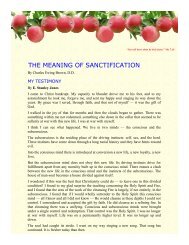W. B. Godbey - Enter His Rest
W. B. Godbey - Enter His Rest
W. B. Godbey - Enter His Rest
Create successful ePaper yourself
Turn your PDF publications into a flip-book with our unique Google optimized e-Paper software.
ut in the Hebrew and Greek, which are now dead languages. God, in <strong>His</strong> providence, after the Scriptures were<br />
written in those beautiful and learned languages, took them out of the world, so that people could not corrupt<br />
them, as they do every spoken language. But we have this grand thesaurus of God's precious truth revealed for<br />
the salvation of a lost world, to which we can go and drink of the water of life, limpid and pure, as it leaps from<br />
the fountain, gushing out beneath the throne of God. You can never drink at these fountains unless you learn<br />
those original languages; but you will be dependent on translators. That is all right as far as salvation is<br />
concerned.<br />
If we drink from the bucket which the translators carried from the fountain, we will never die of thirst, yet, for a<br />
thousand reasons I have not space here to mention, we should much prefer to drink at the fountain itself.<br />
(2) We need the Latin and the Greek languages to qualify us to understand the English, four-fifths of which<br />
are taken from those languages. In our great, beautiful, versatile and voluminous Anglo-Saxon tongue we have<br />
only twenty-three thousand Saxon words, which constitute the nucleus of the great language, comprising the<br />
vast vocabulary of a hundred and fifty thousand words, and that vocabulary rapidly increasing. I have no doubt<br />
but that the English language which is so rapidly spreading over the whole earth and is now the popular<br />
language of the world, so that other nations want their children to learn it, will be the language of the world<br />
during the glorious Millennium, whose rising aurora now thrills the hearts of many waiting and longing<br />
pilgrims. You never can be very proficient in the great English language without a thorough study of Latin and<br />
Greek.<br />
The Alexandrian conquest, B. C. 325, put the Greek language in all the governments under heaven; therefore it<br />
was universal in the days of Christ and <strong>His</strong> apostles. The Roman conquest did the same for the Latin language<br />
three hundred years subsequently. Consequently not only the English, but all other languages in present use are<br />
so largely taken from those tongues that we need those fundamental languages preparatory to the study of all the<br />
modern. A Greek and Latin scholar will learn any of the languages in India much more easily and quickly than<br />
the people who have not received a classical education. If you desire thoroughness in any other language, the<br />
quickest and surest route is through the meandering halls of classical lore.<br />
(3) We need the Latin and Greek to qualify us for real proficiency in the sciences, all of which we have to<br />
study in the nomenclature of these languages. We never can be learned in any sense without studying the<br />
sciences, all of which require us constantly to use the dead languages which will be so difficult to learn and<br />
retain in the memory in case we have never studied them. For example, zoology, which teaches us all about the<br />
animal kingdom, is from zoon, an animal, and logos, science; therefore it means the science of animals.<br />
Astronomy is from astron, a star, and nomos, law; therefore it means the law of the stars. Whereas the sciences<br />
are all expounded in the Greek language, the great bulk of words used in public orations and written<br />
dissertations are from the Latin.<br />
If you would master languages so as to have command of words and easy fluency of speech, it is really<br />
indispensable that you study the Latin and Greek, which constitute the boundless thesaurus and illimitable<br />
vocabulary of universal language.<br />
(4) We are living in by far the most literary age the world has ever known. During the by-gone ages you<br />
could count on your fingers the prominent authors of all nations. Now they are rapidly becoming an<br />
innumerable host, flooding the world with literature. It is certainly a glorious privilege to participate in the<br />
prevailing aspiration to large usefulness. The study of the Latin and Greek, and actual proficiency in the same, is<br />
really indispensable to qualification for efficient authorship.<br />
But you may raise the question of financial inability to acquire these languages. This is really imaginary on your<br />
part. That is a circumstance in your favor and not against you. If you had plenty of money it would be difficult<br />
for you to resist the temptation to luxuriate and prodigalize; if not to actually fall by dissipation and even<br />
debauchery, thus withering and blighting all your hopes of scholarship and usefulness. Read the biographies of<br />
the great scholars and you will find they all had to contend with meager finances, if not actual pauperism, from<br />
the beginning of their educational course. I was a student twenty-one years, and a constant witness of these<br />
phenomena, I. e., the failure and often the wreckage of the rich students, and the brilliant achievements and<br />
college honors conferred upon the poor. So rejoice in your poverty and thank God for thus, in <strong>His</strong> providence,









